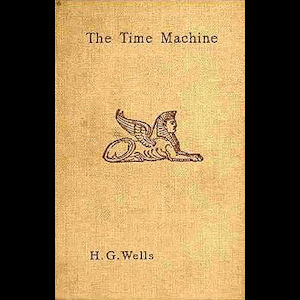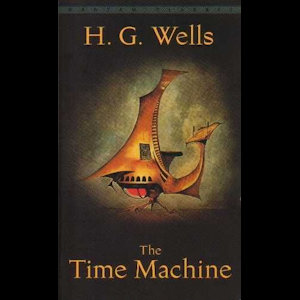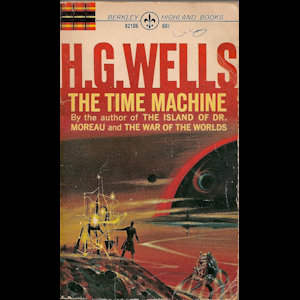The Time Machine by H.G. Wells - Sci-Fi Classic Review
 | | The original cover |
When you think of where time travel fiction got its start, you must consider The Time Machine. Though not the first popular novel to deal with time travel (Rip Van Winkle, A Christmas Carol, and A Connecticut Yankee in King Arthur's Court all predate it), H.G. Wells' classic novel is arguably the first to tackle the subject from the perspective of scientific discovery, and it's the first to feature time travel achieved through technology as opposed to magic, divine intervention, or exotic happenstance. Therefore, it is not a stretch to say it is the prototypical science-fiction time travel tale. It is genuinely surprising, then, that it manages to avoid nearly all the predictable hallmarks of the subgenre that would go on to become tiring clichés, tropes like the grandfather paradox, the meeting of oneself in different times, or the desire to repair past mistakes.
In The Time Machine, our nameless protagonist builds a vaguely-defined machine for the express purpose of traveling freely along the fourth dimension, and he uses it to explore the distant future. There, he encounters a bizarre, egrarian world where intellect has been replaced by blissful, decadent sloth and where the human being has evolved along divergent paths: one half of humanity is now made up of the meek and childlike Eloi, while the other half has become nocturnal, underground monsters called Morlocks. With his machine stolen by the Morlocks, our hero must adapt to this new world long enough to recover his creation and return home. Later, he travels even further into the future to see the Earth's bleak final chapters before returning to his upper class home where he can recount his journey to a group of skeptical house guests.
Wells, despite his modern reputation as one of the founding fathers of the genre, never considered himself a science-fiction writer, and indeed, if you look at his body of work, the majority of it wouldn't meet the definition. More than that, he wasn't concerned with the nitty-gritty details of technology or logistics. When he did write science-fiction, science was more plot device than central focus, used as a conceit to allow him to explore ideas from a unique perspective. In The Time Machine, there is plenty of science--the main character considers himself a man of it, and Wells' descriptions of the far-flung future include plenty of grounded scientific principles, many of which still hold up to scrutiny today--but Wells is clearly more concerned with offering a stark contrast to the concerns of his time.
 | | There are hundreds of covers to choose from, but this one might be my favorite |
His descriptions of life with the Eloi and Morlocks contain elements of social commentary, but the protagonist's uneven understanding of how it all came to be, along with his repeated insistence that his own conclusions are very probably wrong, keep the novel from becoming an obvious satire or preachy allegory. Most fascinating is how thoroughly he discredits the idea of utopia, offering one of the most elegant rebuttals to a broad genre of fiction that was all the rage during the turn of the Nineteenth Century to the Twentieth. (Ironically enough, Wells himself would go on to write several utopias of his own.) The closest Wells ever comes to explaining his future comes when the protagonist theorizes that mankind, having conquered every unpleasantness that life has to offer, no longer has the need for intellect, physical strength, or technological utility. Thus, humanity de-evolved into the twin cultures of the Eight-Hundred-and-Third Century, where scarcity has once again reared its head, resulting in the Morlocks becoming cannibalistic nightmares that hunt the Eloi every night. In short, this is an inevitable future that follows Utopia.
Wells doesn't rest on this explanation, though, and all but urges the reader to come to his or her own conclusions. He seems primarily interested in sharing an adventure, not constructing a complex sociopolitical argument. That lends the novel--which is so brisk one can read it in its entirety in a single afternoon--a certain gentleness that has helped it to endure across multiple centuries. However, upon reflection, the story is rather dark and depressing, especially given the ambiguous downer ending.
Wells manages this trick by disarming the reader from the very start. The story is told unconventionally, framed by a pair of dinner parties in which the narrator, an incredibly minor character, recounts the Time Traveler showing off a small prototype of his machine and then, after returning from his adventure, telling the long story of his trip to the future. We are, in effect, given the ending before the story has even begun, and the bulk of the tale is heresay. We, the audience, get to travel through time a little bit too, by having the ending spoiled before we even know the start. (Granted, there is a bit more to the ending after the Time Traveler has told his story, but it is more epilogue than climax.) Rather than ruining the narrative, this makes it easier to enjoy, knowing that our hero will survive and wondering how he'll get his limp or where his shoes have got to.
 | | Of course, the good old pulp style never gets old |
More importantly, though, this framing device removes us from the fantasy by an extra step, giving us the perspective of an outsider hearing the story told by someone else. It makes it both more deniable and more plausible, which gives Wells more freedom to get a little crazy with his telling. This is how such framing devices should be used, and once you understand how adeptly Wells has exploited it, you'll find other framed stories a bit lazier in comparison. Had the story been told from the hero's perspective or from an omniscient third person, it wouldn't have worked as well. It wouldn't so effectively disarm the reader or draw them into the fantasy, and I don't think I'm overstating things when I write that the world would be lesser for it.
The Time Machine was H.G. Wells' first novel, and it was the beginning of a very long and illustrious career sculpting many of the science-fiction moulds by which millions of stories would be cast in the generations that followed. On its own, it has spawned numerous adaptations for the radio, stage, and screen, sequels by other writers, spin-offs like the wonderful Time After Time in which a time traveling Wells chases Jack the Ripper to the modern age, and more. It's one of the most important science-fiction novels ever written, and pretty much every time travel story told in its wake owes at least partial gratitude to Wells' work. When he published it in 1885, though, Wells was just getting started.
[If you want to know what I think of the 1960 George Pal film adaptation, check out my The Time Machine (1960) Sci-Fi Classic Film Review, or you can check out my review of the 2002 version!]
-e. magill 8/30/2018
|
|